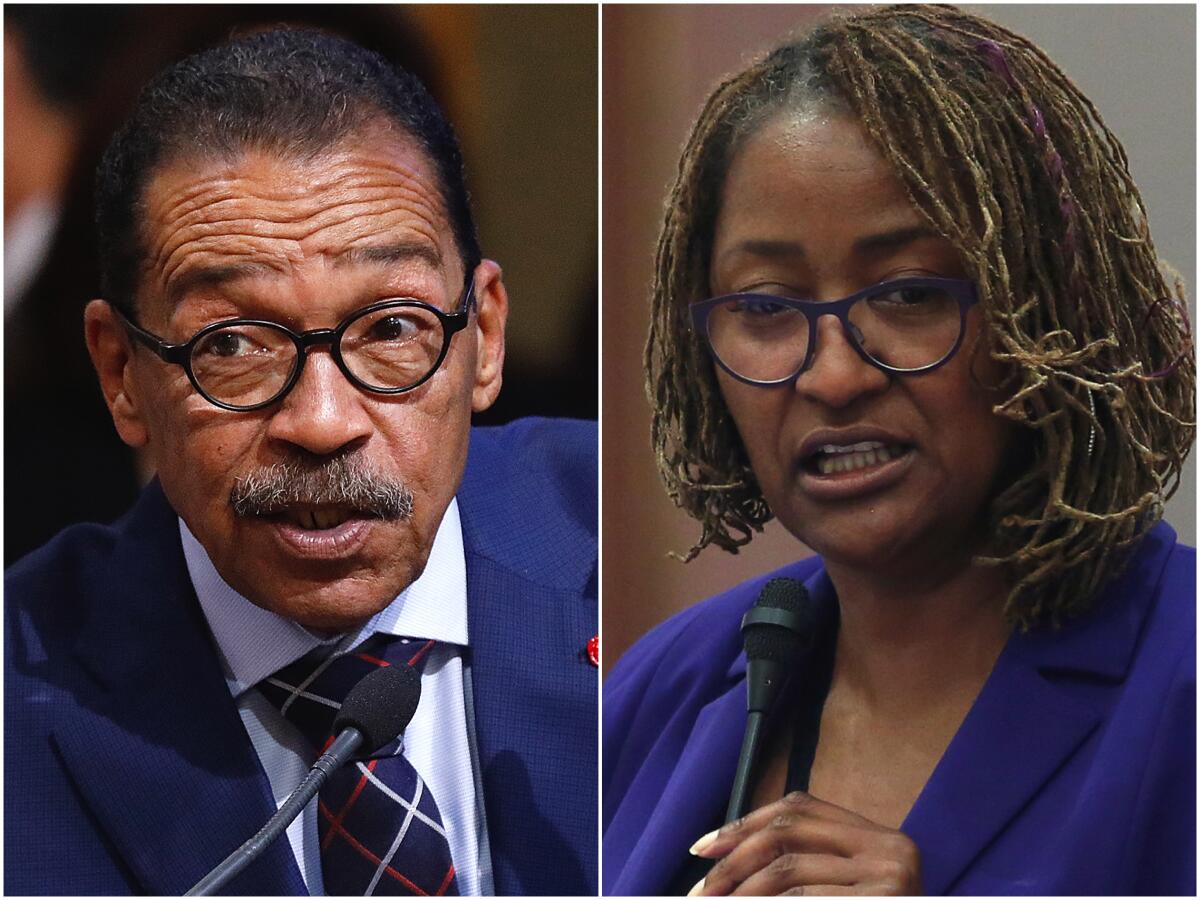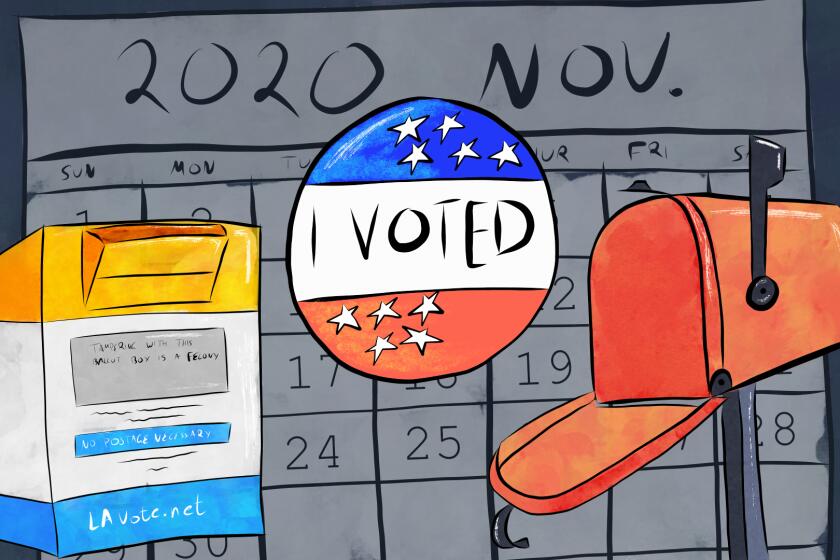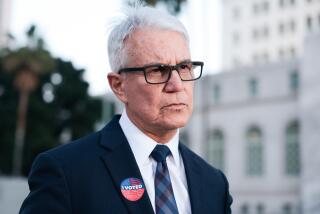D.A., county supervisor and the other top L.A. races at a glance

Los Angeles County District Attorney
The national debate over criminal justice reform and police use of force will be on the ballot this year in Los Angeles, where veteran Dist. Atty. Jackie Lacey is trying to fend off a challenger who represents a push to elect more progressive prosecutors nationwide, in former San Francisco Dist. Atty. George Gascón.
Lacey, who is seeking a third term, became L.A. County’s first woman and Black district attorney in 2012 and ran unopposed in 2016.
She has overseen an office that has secured convictions against a number of high-profile defendants during her two terms — including Lonnie Franklin, the “Grim Sleeper” serial killer; and rap mogul Marion “Suge” Knight — and enjoyed broad support among law enforcement.
While she’s seen as more of a traditional law-and-order prosecutor, Lacey has also championed diversion programs for nonviolent offenders and the mentally ill in some cases, though they represent a small portion of the hundreds of thousands of cases her office has tried during her two terms.
Lacey has repeatedly declined to prosecute L.A. County law enforcement officers who have shot unarmed suspects, making her the target of ongoing protests.
Gascón, who sees himself at the forefront of a wave to elect more progressive prosecutors across the U.S., championed restorative justice programs and alternatives to incarceration for eight years in San Francisco.
He also co-wrote Proposition 47, the landmark legislation that reduced several felonies to misdemeanors in California, and championed a bill last year that could make it easier to prosecute police officers in fatal use-of-force cases.
Property crime soared under Gascón’s tenure in San Francisco, which some allege resulted from the lack of the threat of prosecution against low-level criminals, stemming from his office’s use of diversion programs. Gascón also declined to prosecute San Francisco police officers in a number of controversial shootings in the Bay Area, though he has argued his hands were tied by restrictive laws.
— James Queally
Los Angeles County Supervisor 2nd District
In a rare opening on the L.A. County Board of Supervisors, L.A. City Councilman Herb Wesson and state Sen. Holly Mitchell hope to succeed Mark Ridley-Thomas in the 2nd Supervisorial District — which includes Carson, Compton, Culver City, Inglewood and several L.A. neighborhoods.

Wesson joined the Los Angeles City Council in 2005 and was council president from 2012 until January, when he stepped aside as president to focus on his campaign.
He has said his accomplishments as council president include multiple increases in the city’s minimum wage, passage of a $1.2-billion bond measure to battle homelessness and a shift in the city’s election schedule to even-numbered years, a step aimed at boosting voter turnout.
Wesson played a major role in shepherding Charter Amendment C — which allows police officers to have their cases heard by all-civilian boards — onto the ballot in 2017. Many community advocates, including Black Lives Matter, were squarely against the measure, which was pushed by the police union. Voters approved the measure.
First elected to the state Legislature in 2010, Mitchell represents the 30th Senate District, which stretches from Century City to South L.A. Her accomplishments include getting nearly 70 bills passed that targeted many systemic injustices in the criminal justice system, and inequities faced by foster youths and families.
Mitchell has served as chair of the Senate Budget Committee since 2017, including this last year when the state faced a $54-billion shortfall. She successfully blocked cuts to Martin Luther King Jr. Community Hospital in South L.A.
If Wesson is elected, he will be only the second Black man elected to the Board of Supervisors, once dubbed the “five little kings” and historically all white and male. If Mitchell wins, the Board of Supervisors will, for the first time, be an all-female board.
— Jaclyn Cosgrove
Los Angeles City Council District 4
In a district that stretches from the Miracle Mile through the Hollywood Hills to Sherman Oaks, incumbent Los Angeles City Councilman David Ryu is competing against former nonprofit executive Nithya Raman.
Key issues in the race include homelessness, revamping policing and combating corruption. Ryu has campaigned as a progressive reformer who championed new restrictions on political donations from real estate developers and pushed for new housing and shelter for homeless people.
But Raman has challenged whether Ryu has done enough to advance progressive change at City Hall. She wants to create a new network of “community access centers” to assist homeless people and end policies that criminalize homelessness. Ryu, in turn, has argued that he has an established record of accomplishments in the city.
Ryu and Raman have backed many of the same ideas, including full public financing for city candidates and expanding the council. Raman had called for a rent freeze during the primary; Ryu succeeded in pushing one through amid the COVID-19 pandemic.
But the two differ on some key points. To combat corruption, Ryu wants to create a new office as a watchdog on development decisions; Raman argues that the city should instead bolster funding for the existing Ethics Commission. Both want “rent forgiveness” plans to relieve struggling tenants of rent debt, but disagree on how to fund them.
— Emily Alpert Reyes
Los Angeles City Council District 10
L.A.’s 10th District, taking in Koreatown, Mid-City and parts of South Los Angeles, has had the same representative on the council for nearly 15 years: Herb Wesson, a well-known deal maker and former council president.
Now, because of term limits, Wesson is looking to fill the seat currently held by County Supervisor Mark Ridley-Thomas. And Ridley-Thomas, another political veteran facing term limits, is hoping to replace Wesson on the council. First, however, he must square off against attorney Grace Yoo, his opponent in the Nov. 3 runoff election.
Ridley-Thomas, a longtime civil rights advocate, has spent the last three decades winning elections, prevailing in city, county and state contests. He’s looking to return to the council after an 18-year absence — but is also seen as someone laying the groundwork for a run for L.A. mayor in the near future.
Yoo, an activist and former executive director of the Korean American Coalition-Los Angeles, is making her second run at the seat. She’s forged a reputation as a fighter against City Hall, pushing back against plans for ripping out trees in Hollywood, redrawing the city’s council district boundaries and constructing a 27-story residential tower that would have been twice as dense as the city’s rules allowed.
With City Hall the subject of a far-reaching federal bribery inquiry, Yoo is running as a reformer, calling for funding at the city’s Ethics Commission and city controller’s office to be shielded from political intrusion. Yoo also wants to ensure that Ethics commissioners are no longer selected by the politicians they are assigned to watch over.
Ridley-Thomas, in turn, has been running on his lengthy track record as an elected official, pointing to his work fighting homelessness, building affordable housing and reopening Martin Luther King Jr. Community Hospital in Willowbrook. The county supervisor also touts his recent effort to have local government treat systemic racism as a public health issue, one that affects education, employment, housing and many other areas — especially for the county’s Black residents.
If he wins, Ridley-Thomas won’t be able to use his experience on the council very long. Because of term limits, he is permitted to serve one final four-year term before stepping down.
— David Zahniser
L.A. Board of Education District 3
District 3 stretches across most of the west San Fernando Valley. The most politically conservative board district, its voters rejected incumbents in three of the last four elections. The race presents a choice between one-term incumbent Scott Schmerelson, who is supported by the teachers union, and Marilyn Koziatek, who works at a charter school and is supported by charter backers.
A former Spanish teacher, Schmerelson, 69, was a longtime and well-liked principal. He relishes going to campuses and trying to problem-solve local, campus-based issues. He also says he’s worked successfully to give parents greater voice through committees and forums, especially on behalf of children with special needs, while also acknowledging that the district can do more.
Schmerelson has been a reliable ally for teachers union efforts to limit the expansion of charter schools, but some charters are well regarded in his district, and he generally does not interfere with their operations. He finished first in the primary, with 42% of the vote.
Koziatek, 39, manages community outreach for Granada Hills Charter High School, helping to oversee public relations, parent communication and work on obtaining grants.
She’s also active in local civic organizations, frequently on matters related to education. She promotes her parent perspective, as no current board member has children now in school. While Koziatek praises her children’s neighborhood elementary school, she takes aim at Schmerelson as representing a status quo that has not accomplished enough on behalf of students.
— Howard Blume
L.A. Board of Education District 7
The winner of this contest will replace longtime incumbent and current board President Richard Vladovic, who is barred from seeking reelection by term limits. The district stretches from South L.A. to the Harbor area. The candidates backed by the teachers union need to win both races or the majority of the board will shift to candidates backed by donors who support charter schools.
Patricia Castellanos, 50, would bring a union ally to the board, one who would work to limit situations in which neighborhood schools are required to share their campuses with privately operated charter schools. State law requires the district to offer space to charters.
Most recently, she’s worked as a deputy to county Supervisor Sheila Kuehl on job creation efforts. She’s also been involved in labor-backed campaigns to improve air quality and working conditions at the port. She says she would bring a parent’s perspective to the board and political savvy that would help in policy and funding battles.
Her opponent, Tanya Ortiz Franklin, 36, is steeped in school site issues as part of the leadership team at the Partnership for Los Angeles Schools, a nonprofit that manages 19 of the district’s historically lowest-performing campuses. Franklin is particularly experienced in restorative justice, which replaces student suspensions with intensive counseling. She’s also worked on elementary arts instruction and as part of the nonprofit’s policy team.
Although campaign spending in support of Franklin is mostly from donors who’ve supported non-district-run charter schools, her career is rooted in district schools. She says she has a concerted focus on equity that goes back to seeing only half her classmates graduate from her local public high school.
— Howard Blume
Measure RR – L.A. Unified school construction and renovation bonds
Twelve years after voters approved the $7-billion Measure Q, L.A. Unified is back with Measure RR, a $7-billion bond proposal that would pay for campus renovation and construction as well as technology.
Supporters of the measure, which include major business and labor groups, hope the chances for passage will be strong in November, when the presidential election will bring out more voters who are likely to support spending on schools. The measure requires 55% of the vote to pass.
The district has a long list of repairs and upgrades, including work on ceilings, bus purchases, new air conditioners and seismic retrofits. Also on the list are mobile computers and other technology. Using bond funds — which are repaid over decades — for short-lived technology has been controversial in the past, but became accepted practice this spring when the pandemic forced campuses to close. The district used nearly $80 million left over from previous bonds to purchase computers for students to use at home.
The bond would increase property taxes. The Howard Jarvis Taxpayers Assn. opposes the measure as an unfair additional burden, asserting that past bond funds have not been spent efficiently.
To pay for Measure RR, property owners would be taxed an average additional fee of $22 a year per $100,000 of assessed property value.
— Howard Blume
More to Read
Get the L.A. Times Politics newsletter
Deeply reported insights into legislation, politics and policy from Sacramento, Washington and beyond. In your inbox three times per week.
You may occasionally receive promotional content from the Los Angeles Times.








